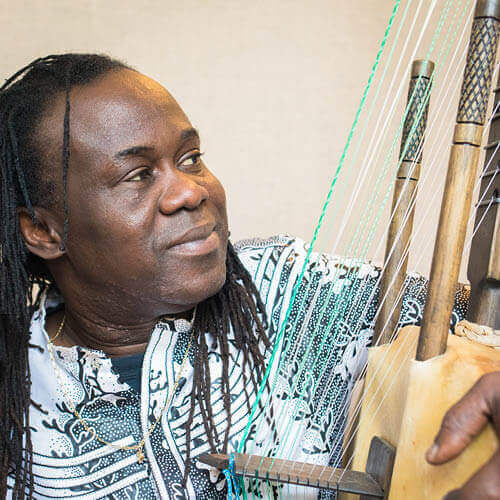Zal Sissokho
Singer and songwriter Zal Sissokho is also a great kora player. Originally from Senegal, he excels in combining his openness to the world with his desire to preserve his culture and the oral traditions of West African peoples. Singing in Mandinka and Wolof, he has been nurtured by the encounters that have marked his career and that enable him to continue learning and sharing.
Since settling in Montréal in 1999, this recipient of multiple grants from the Canada and Québec arts councils since 2001 has given solo performances and has appeared with numerous artists including the Diouf bothers, Celso Machado, Constantinople, Fakhass Sico, Lilison di Kinara, Richard Séguin, Takadja and Muna Mingole.
In 2004, he formed the Afro-Mandinka group Buntalo, which achieves a perfect balance between the modernity of their compositions and the Mandinka classical repertory, thanks to the kora. This instrument, charismatic and enchanting, fits wonderfully with contemporary western music and with the musician’s impressive capacity for improvisation, in a style he likes calling “tradimodern.”
The group put out three albums under the label Disque Nuits d’Afrique (Silaba “The long road” en 2008, Le Partage en 2012 et Le Palabre en 2017), well received by the public and critics alike. Buntalo used this showcase to make its music and the unique sound of the kora better known. Its first album, Silaba, selected as part of a Montréal arts council touring program, enabled the group to give a series of 10 concerts between September 2007 and June 2008. An award in 2008 from the Office Québec-Amériques pour la jeunesse opened the way to performances in Mexico.
Zal’s ancestral melodies, his artistic sensibility and his generosity give him a special place on the Québec and international music scenes. He also took part in the Cirque du Soleil’s show Ô in Las Vegas, in the music for the film A Sunday in Kigali by Robert Favreau and in the music for L’Autre Maison by Mathieu Roy, selected for the official opening of the Montréal World Film Festival in 2013.
On February 7, he released his new album, Kora Flamenca, a poetic journey in the discovery of flamenco’s African roots. This disc, issued by Analekta following a creative residency at the Centre des musiciens du monde, focuses on an encounter between Zal Sissokho and one of the few female flamenco guitarists, Caroline Piché. The desire of both artists to combine their distinctive aspects rather than amalgamate them gives the disc a unique character, on the boundary between history and experimentation.
An elegant and delicate atmosphere emerges from this musical project, which will undoubtedly be sublimated by the intimate character of the Gésu, in the Prestige series.




